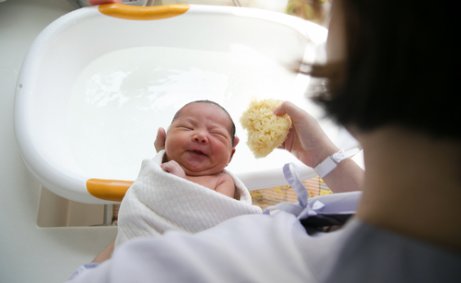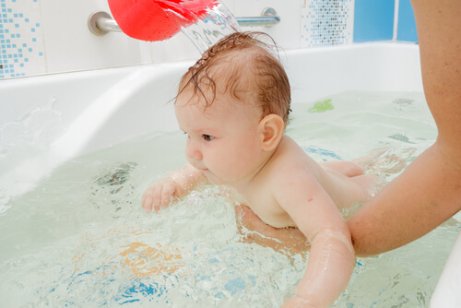6 Tips for Your Newborn Baby's First Bath

Some of the most frequent questions have to do with how to hold the baby so he doesn’t slip or fall.
Mothers are also often unsure when the right time is to bathe their babies for the first time.
And, of course, there are a lot of doubts about how to get the right water temperature.
While you may have a bit of fear and anxiety about your baby’s first bath, it will no doubt be an unforgettable experience.
Bathing your little one is a beautiful opportunity to communicate love and security. That’s why learning the right techniques is worth it.
So, what do you need to know before your baby’s first bath? Keep reading to find out!
1. When is the right moment to give your baby her first bath?
Specialists recommend giving your baby her first bath between 7 and 15 days of life. By this time, the umbilical cord will probably have fallen off, so infection should no longer be an issue.
Keep in mind the bath should be short – no more than 5 minutes.
2. What’s the ideal water temperature for bathing a newborn?
Your baby’s bathwater should be around 100 degrees Fahrenheit. To control the water’s temperature, you can dip your elbow or forearm into the bath basin.
Using your hands to gauge water temperature isn’t a good idea, since your hands are already used to frequent temperature change.
As for how full the bath should be, aim for the water to be about 4 inches deep. That way, you can rest your baby on the bottom of the basin and avoid the risk of him slipping or falling as you bathe him.
3. What things do I need for my baby’s first bath?
Before you fill the basin and put your baby in the water, you need to make sure you have everything you need.
Once your baby’s bath has begun, you won’t be able to go away to grab something you forgot.
Having everything ready will also make you feel more secure while bathing your little one for the first time in her life.
The most obvious thing you’ll need is a place to bathe your baby, such as a basin or a portable tub.
You also need a comfortable spot nearby where you can carefully undress your little one. You should place the hygiene items you’ll be using within easy reach.
These items will likely include: Tear-free baby shampoo, neutral soap, baby oil, wash clothes, a towel, a clean diaper and clothes, and a comb or brush.
Other items you might want to consider are Vaseline, cotton balls or sterile gauze, and rubbing alcohol.

6 tips for your baby’s first bath
Many babies feel right at home when you place them in the bath water for the first time.
This is because it reminds them of the 9 months they spent in the uterus, surrounded by warm amniotic fluid.
Keep in mind the following suggestions when bathing your newborn for the first time:
- Undress your baby completely and wrap him with a towel before moving him to the bath basin.
- Place your little one into the water gradually so as not to startle him. You should use one hand to provide support for your baby’s head and neck.
- Use a minimal amount of soap to wash your baby’s body. You can start with the chest, arms, hands and then move down to his legs and arms. Finally, rotate your baby carefully so you can wash his back and bottom. Remember that a newborn baby’s skin is very delicate, so be very gentle as you wash, and avoid scrubbing.
- After washing your baby’s body, you can move to the head.
- Wash your baby’s eyes with sterile cotton or gauze and fresh water. Don’t use bath water for this. Gently wipe around your little one’s tine eyes, moving from the nose outwards.
- Once you have completed all of these steps, take your child out of the bathtub and wrap him immediately in a clean towel.
- Finally, use a clean cotton ball or gauze to clean your baby’s nose and ears. You should never clean the insides, but rather only the outside surfaces of the ears and nose.
And that’s it! All you have to do now is dress your little one and enjoy some post-bath snuggles!
“Specialists recommend giving your baby her first bath between 7 and 15 days of life”
Further recommendations
Below are a few more things you should take into consideration regarding your baby’s bathtime:
- You should never leave your baby alone during her bath – not even for a second.
- During your baby’s first months of life, avoid the use of baby powder and perfumes as they can produce allergies and even respiratory issues.
- Place your baby’s bath basin at a height that’s comfortable for you. Wash the bathtub after your baby’s bath.
- Remember to smile at your little one and speak to her throughout the process. This will help your baby feel safe and calm, and is also a great way to connect with your child.
- If your baby starts to cry during bath time, don’t be discouraged. Your loving touch and voice, as well as a calm environment, will help your little one get used to taking baths. You’ll see she’ll start to enjoy them in no time.

In conclusion, a baby‘s first bath is one of the most pleasant and beautiful moments for parents to enjoy.
If you’re a first-time mother and you’re worried about bathing your newborn, we’re sure you’ll find these suggestions to be helpful.
If you choose the right moment, and you and your baby are both relaxed, the experience is sure to be a special one.
Try to communicate calm and happiness. If you’re especially nervous, you can always ask someone else to join in the activity.
This text is provided for informational purposes only and does not replace consultation with a professional. If in doubt, consult your specialist.








